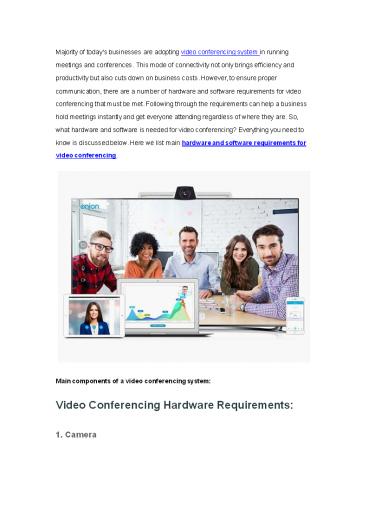Hardware and Software Requirements for Video Conferencing - PowerPoint PPT Presentation
Title:
Hardware and Software Requirements for Video Conferencing
Description:
Following through the requirements can help a business hold meetings instantly and get everyone attending regardless of where they are. Everything you need to know is discussed below. – PowerPoint PPT presentation
Number of Views:32
Title: Hardware and Software Requirements for Video Conferencing
1
Majority of today's businesses are adopting video
conferencing system in running meetings and
conferences. This mode of connectivity not only
brings efficiency and productivity but also cuts
down on business costs. However, to ensure
proper communication, there are a number of
hardware and software requirements for video
conferencing that must be met. Following through
the requirements can help a business hold
meetings instantly and get everyone attending
regardless of where they are. So, what hardware
and software is needed for video conferencing?
Everything you need to know is discussed below.
Here we list main hardware and software
requirements for video conferencing.
Main components of a video conferencing
system Video Conferencing Hardware
Requirements 1. Camera
2
- One of the most basic hardware used in video
conferencing system is the web cam. This camera
is basically used to record a video signal sent
to people on the other end of the live session.
Businesses particularly need high-definition (HD)
conferencing cameras that - come with advanced features like remote control
pan, tilt and zoom. In the medical applications
or educational conferences, participants may need
to use additional or secondary cameras to ensure
more clarity. Adopting HD cameras simply ensures
participants enjoy the highest resolution even
with the largest images. - Codec Unit
- Another important hardware required for video
conferencing is the CODEC (coder- decoder). Its
major work is to take audio and video feed,
compress it and then transmit it via an IP
network. It also decompresses or expands incoming
audio and video stream and maintains the
networks data link. - Video Display
- Video display is a very important component of
any video conferencing system. It is mainly used
to provide monitor display for live video
conference sessions. Some of the most common
video conferencing displays available in the
market include LCD, HD Plasma display, LDP
Projector and XGA PC Type Display. Majority of
businesses prefer high-definition display
ranging between 720p and 1080p because they offer
the best resolution. Such displays also offer
extra viewing space compared to standard monitor
devices. - Microphone and Speakers
- Microphone and audio subsystems are also an
important part of hardware needed for video
conferencing. Analogue microphone pods can be
used to meet video conferencing needs,
especially for a small group of people.
Participants need microphones or headsets to
communicate with attendees on the other end
during a live session. - Intermediate video collaboration systems adopt a
gated selection of digital microphones that run
on integrated software. These types of
collaborative microphones are used in
3
- large group interactions. Microphones used in
video conferencing should be able to deliver
instant connectivity and cancel any background
echoes. - To complete the list of video conferencing
hardware requirements, a business needs to find
a good set of speakers that produce clear audio.
Poor quality speakers can lead to participants
not hearing everything or missing out on
important details of the meeting. - Video Conferencing Software Requirements
- Desktop End-Point Software
- Desktop endpoint applications or browser-based
interfaces are software in a PC that facilitate
access to instant video conferencing. These
applications simply rely on existing built-in
cameras or external USB-connected devices to
relay information. For the audio system to work
perfectly, it must work with integrated
microphones, speakers or any other USB-connect
devices. Many video conferencing providers, like
Zoom, Lifesize - and ezTalks, released its own video conferencing
software, which are fully compatible with
Windows, Mac, iOS and Android. Browser-based
clients can also make use of webRTC (web
real-time communication) capabilities of browsers
like Firefox and/or Chrome to support video
conferencing. - Broadband Internet Access
- In order to enjoy instant video conferencing
streaming, a business needs a high-speed
internet service. Getting a broadband modem,
instead of a standard modem, can help deal with
the huge bandwidth that's involved in running
live conferencing sessions. The aim of having a
stable internet access capability is to ensure
smooth instant streaming, clarity of audio/video
and consistency in making presentations. PCs used
in connecting to video conferencing sessions can
establish internet access through routers fitted
in the business offices. - Mobile Video Apps
4
Mobile video applications can enable meeting
attendees to participate in video conferences
via their smartphones, tablets or iPads
regardless of wherever they're located. 4. Web
Conference Software Adopting web conference
software can help add a number of important
features to a business' video conference needs.
These video conferencing software not only
facilitate VoIP (Voice over Internet Protocol)
communication but also allow for video streaming,
application sharing and private text chats. Most
of the software also come with record and
playback ability, whiteboards, instant messaging
and inbound faxing. They can simply be a perfect
addition to your list of hardware and software
requirements for video conferencing. Conclusion
These are among some of the video conferencing
hardware and software requirements that you
might to consider as a small business. While
acquiring all these components can cost you
extra money, it will pay off in the long run.
Having a stable video conferencing system will
ensure efficient communication, higher
productivity and reduced costs. Investing in
hardware and software for video conferencing is
simply worthwhile.
https//www.eztalks.com/video-conference/hardware-
and-software-requirements-for-video-cobferencing.h
tml































